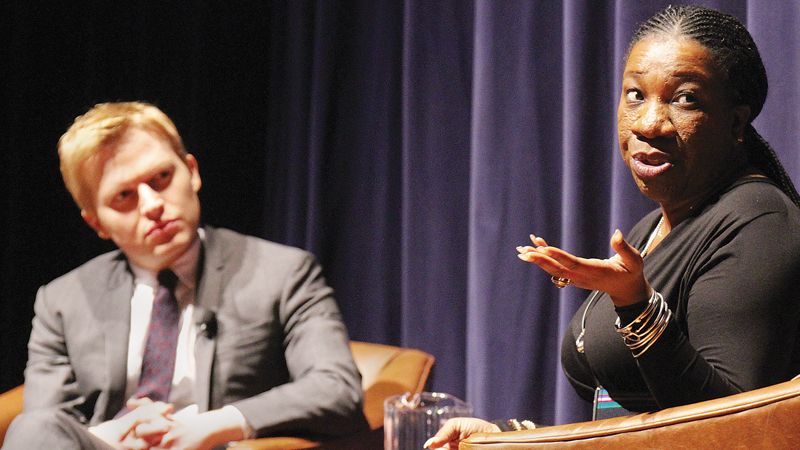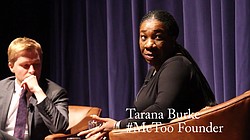Much more to #MeToo, symposium speakers say

By AMANDA TONOLI and WILLIAM K. ALCORN
news@vindy.com
YOUNGSTOWN
Tarana Burke #MeToo Founder

#MeToo founder Tarana Burke and journalist Ronan Farrow were featured speakers at the YSU Cententofanti Symposium.
The #MeToo movement was something “destined to break through,” said Ronan Farrow, a journalist whose reporting exposed Harvey Weinstein’s history of sexual assault.
Farrow was accompanied Wed
nesday to Youngstown State University’s Centofanti Symposium by Tarana Burke, senior director at Girls for Gender Equity in Brooklyn, N.Y., and #MeToo founder to raise awareness about sexual violence. They spoke to students at Stambaugh Auditorium.
YSU student Mara McCloud, a political science major, said when she heard about the symposium’s guest speakers she jumped at the chance to get tickets.
“It’s amazing to get two people incredibly relevant in the news,” she said. “The #MeToo movement is definitely popular on any college campus which is also leading toward people finding their passion for human rights.”
In short, the #MeToo movement is “a succession of people coming forth,” Burke explained.
“I think after the [2016 presidential] election women just became really fed up,” she said. “It created a perfect storm.”
Farrow said that the correlation isn’t as simple as some may think, however.
“It’s not as simple as [President Donald Trump’s] ‘grab her by the p’ and people got fed up. But it was much more than that,” Farrow said. “More and more cut-throat ways were making women more afraid, not less, to come out and tell people their stories.”
Burke said the country responded differently than it had in the past.
“Women who came forward took that risk in telling their truths,” Burke said.
Part of this was because of a different type of culture.
“We have this new generation of particularly female reporters who are unshackled from traditional values, and maybe some outlets that don’t care about access as much as telling those stories,” he said.
In that light, Farrow said, things are in some ways better than they once were.
That, however, isn’t catch-all.
“When people say we are in an era of a cultural shift, I say, ‘wait a minute, not just yet,’” Burke said. “We have legislation and policies that need change – nationally, regionally and locally. It’s not true to say culture hasn’t changed, but what needs to happen is better comprehensive sex education to learn about sex and boundaries. If we started now when kids are young and follow up in 12th grade, then that will be a culture change.”
In addition, Burke said work with survivors needs to grow.
“We hear about the men who committed crimes ad nauseum and focus – always – on everybody and everything but the people, the survivors,” she said. “There is just so much more to #MeToo.”
And that is what Farrow said is a delicate balance.
“Everyone I’ve talked to has always said, ‘I wish another woman would have warned me about so-and-so,’” he said. “It’s about maybe giving them an opportunity to release a moral burden and help someone else.”
Burke maintained that regardless, every survivor’s journey is different.
“#MeToo is just an entry point,” she said. “Don’t force yourself into this. You don’t owe anybody your story and your healing process and journey is your own.”
Women in the audience said they attended to learn more about the #MeToo movement and gather with other women of all ages.
“The #MeToo movement is a way to empower women whose voices weren’t heard previously,” said a young woman, Hanna Gilligan of McDonald. “The movement is especially valuable for younger women, from high school to early college age, when they are at their most vulnerable because young people are less likely to be believed. It makes them feel safer and more in control of their own bodies. I’m glad there is more discussion about consent,” she said.
“It’s time to be done with it,” said Kelly Wilson, of Poland, of sexual harassment.
Wilson, 51, was in the Stambaugh audience of about 2,000 with her friend, Sharon Holko, 58, also of Poland.
“Unwanted advancement by anyone in the workplace is very uncomfortable. It gets a little murky if it is your boss. I’ve seen a career get stalled when an unwanted advance was rejected,” said Wilson.
“It’s about time,” said Holko, who recounted a time when she was 18 and a boss called her into his office and told her to wear a short skirt to work.
“The #MeToo movement is good for women of all ages. We have tolerated sexual harassment forever. This is changing the norm. The time has come to be able to go to work and be equal,” Holko said.
 43
43
